Skateboarding is a relatively inexpensive sport, especially compared to surfing, snowboarding, and BMX, but hobbiests still require a few pieces of equipment to get them off the ground. One of the most important pieces of kit – barring skateboards themselves – are skate shoes, and the key to pulling off some great tricks without injury.
Skate shoes have been in the market since the 1960s, steadily evolving into the more modern options we see today. In this article, we’ll cover everything sellers must consider when purchasing the right skate shoes for sale.
Table of Contents
An overview of the skating shoe market
5 aspects to consider when stocking skate shoes
Conclusion
An overview of the skate shoe market
The skate shoe market is expanding rapidly, with experts projecting it will grow at a 3.9% CAGR from USD 3 billion in 2023 to USD 4.5 billion in FY 2033. The market owes its growth to the increasing popularity of skateboarding around the world and the rising participation and coverage of global skateboard events.
But that’s not all, the number of skateboarding events worldwide and the expansion of parks and facilities are also set to bolster market development and sales. North America is the leading market, with the United States drawing in significant sales and revenue. Europe comes in second, with the United Kingdom benefiting specifically from the presence of several global and local skateboarding companies.
5 aspects to consider when stocking skate shoes
Skate shoe type
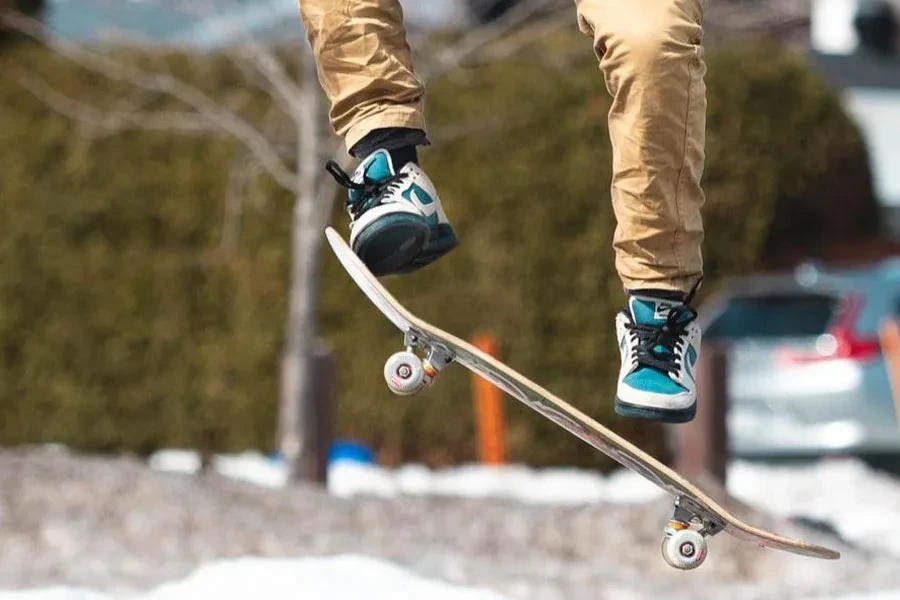
Skaters need the right shoes to achieve maximum performance. And since everyone has a different style and requirements, skate shoes have also evolved to accommodate this variety. These differences can be divided into three main skating shoe styles.
High-top skate shoes
These skate shoes are quite popular for their distinct, slightly above-ankle designs, which provides extra padding and cushioning, giving wearers better stability.
Mid-top skating shoes
Skaters looking for comfort and protection without sacrificing movement and versatility will likely gravitate toward mid-top skate shoes. These balanced models can handle a variety of skating styles and are transitional, meaning they can be worn all year round.
Low-top skate shoes
These skate shoes are the go-to option for most skaters. Why do consumers love them so much? Well, their below-the-ankle and extremely lightweight design makes them easier to maneuver during tricks.
Upper material type
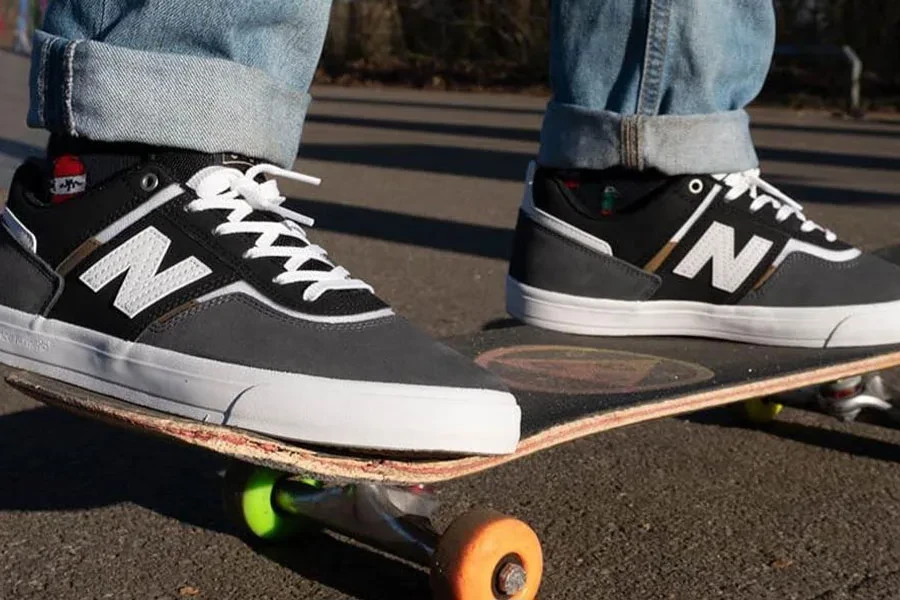
A skate shoe’s upper material is responsible for providing warmth, breathability, comfort, ventilation, and cushioning. Which material the wearer prefers will mostly come down to personal aesthetic preference. The table below gives more details on upper material types:
| Upper material type | Description |
| Suede | The most popular option for skating shoes, suede is strong, wear-resistant, and flexible – all qualities that help make them last |
| Coated/patent leather | Although coated leather is thinner and less durable, it is the most affordable upper-section material, hence it’s great for consumers on a budget |
| Canvas | Canvas is loved by skateboarders for its light, breathable, and durable qualities |
Skate shoe sole
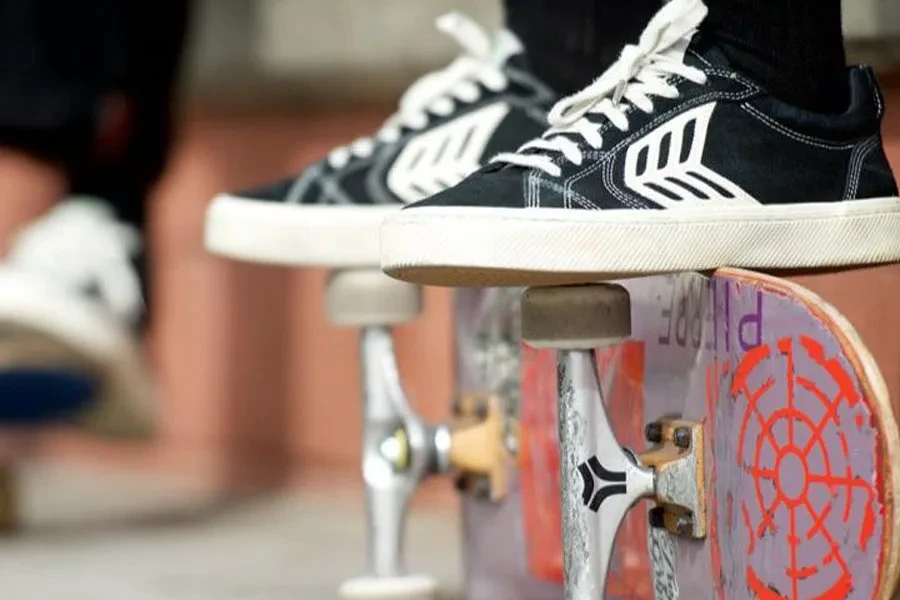
Another critical aspect of skate shoes is their soles, which businesses must approach from the angle of how they are designed and constructed.
From the design perspective, sellers can consider two variations: vulcanized and cup soles. Vulcanized soles are made up of thin layers of rubber that provide maximum agility and flexibility. They are great for consumers looking for an unrivaled board feel. They usually don’t come with seams, and are instead glued together to give them that impressive performance.
Conversely, cup soles are usually a little heavier, sacrificing some of the shoe’s flexibility. However, this may be a worthwhile trade-off for consumers looking for something more durable. These are usually sewn into the skate shoe.
Sellers must also consider three different variants regarding sole construction:
The outsole
Since this part is always in contact with different surfaces (terrain, water, grip tape, concrete, and terrain) and must provide maximum flexibility and grip, prioritize outsoles made from durable materials. Additionally, look for outsoles displaying high-tech air pad designs and shock-absorbing patterns.
The midsole
Midsoles are what separate the inner and outer soles. The best varieties are made from ethylene vinyl acetate (EVA) and phylon (heat-resistant plastic), giving them amazing dampening performance. However, be aware that the design, technology, and construction may vary from manufacturer to manufacturer.
The insole
Unlike the other soles, insoles are removable and interchangeable, allowing wearers to personalize them according to their preferences. This allows consumers to easily swap them when they want a little extra cushioning or a better board feel.
Size
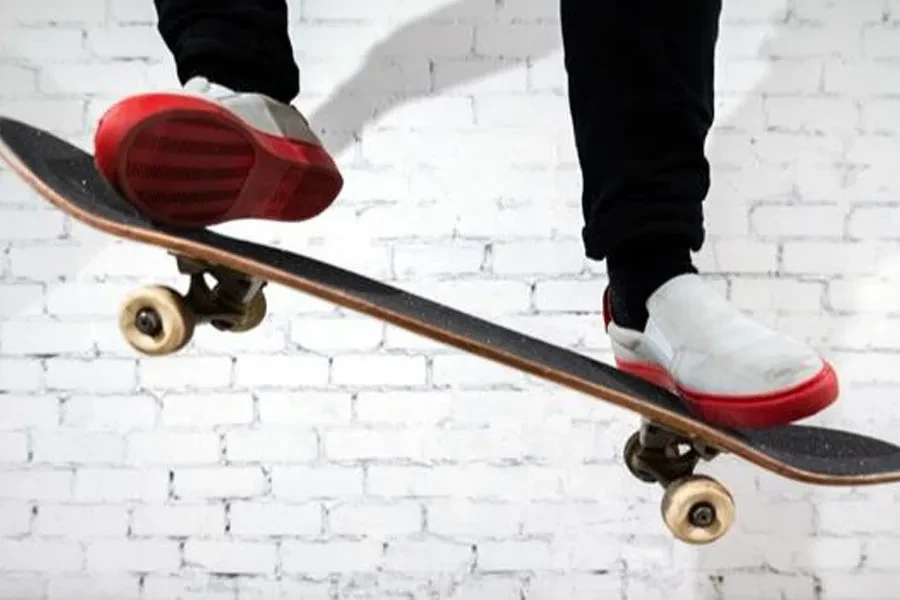
As with any other shoe, skate shoes won’t provide an optimum experience if they don’t fit correctly. Check the size chart below to see different sizes (US, EU, and CM) and who are best suited for:
| US | EU | CM | Perfect for |
| 4 to 4.5 | 36 to 36.5 | 22 to 22.5 | Children and youth with smaller feet |
| 5 to 5.5 | 37 to 37.5 | 23 to 23.5 | Youth and women with smaller feet |
| 6 to 7 | 38.5 to 39 | 24 to 25 | Women and some men with smaller feet |
| 7.5 to 8 | 40 to 40.5 | 25.5 to 26 | Average-sized women and some men |
| 8.5 to 9 | 41 to 42 | 26.5 to 27 | Average-sized men and women with larger feet |
| 9.5 to 10 | 42.5 to 43 | 27.5 to 28 | Average to larger-sized men |
| 10.5 to 11.5 | 44 to 45 | 28.5 to 29.5 | Larger sized men |
| 12 to 14 | 46 to 48 | 30 to 32 | Men with very large feet |
Features
Now that we’ve covered the main factors for sourcing the right skate shoes, it’s time to look at some of the smaller – but no less important – details; those things that hold the shoe together:
Seams
Sellers must never gloss over seam quality, especially when dabbling with high-end skate shoes. These reinforcements help skate shoes to resist impact, with some advanced shoes coming with additional seams in the heel and toe cap zones, i.e. those areas that are in close contact with surfaces.
Padding
Tricks are a huge part of what makes skating fun, but they can put stress on the feet, knees, and legs. That’s why padding is important, helping to keep wearers comfy and pain-free. Good padding is therefore vital for preventing stress and strain-related injuries.
Ventilation
A day of skating is likely to leave you with sweaty feet, which is why ventilation is also key. Breathable materials help to keep shoes dry and reduce the chance of damage over time.
Conclusion
Stocking the right skate shoes becomes less tricky when retailers know what exactly to look for. The ideal shoe should be well-made, comfortable to wear, and feature quality materials. With 550,000 searches in February alone, it’s clear that the skate market presents an incredible investment opportunity for businesses.
If you’re looking for more quality information on other top-quality sports items to sell in 2024, subscribe to Chovm.com Reads today.

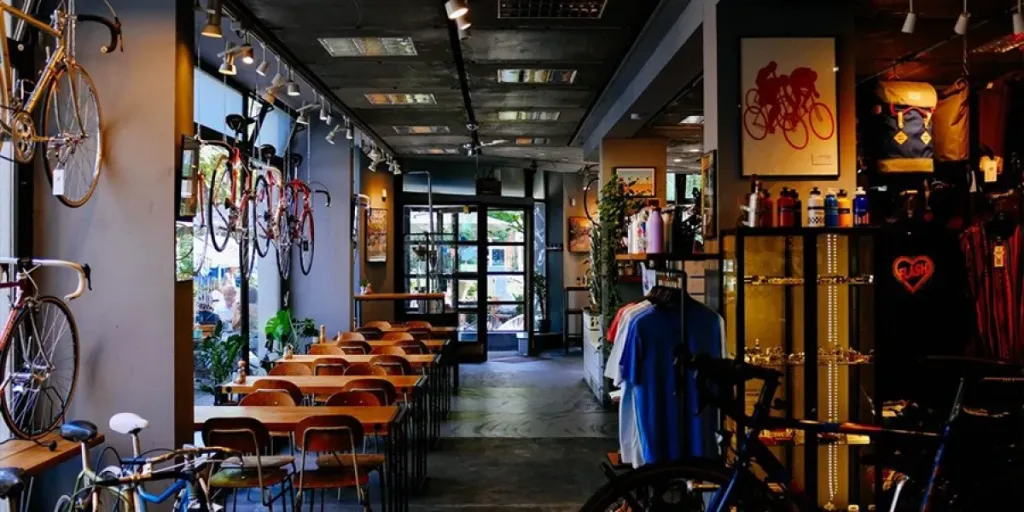

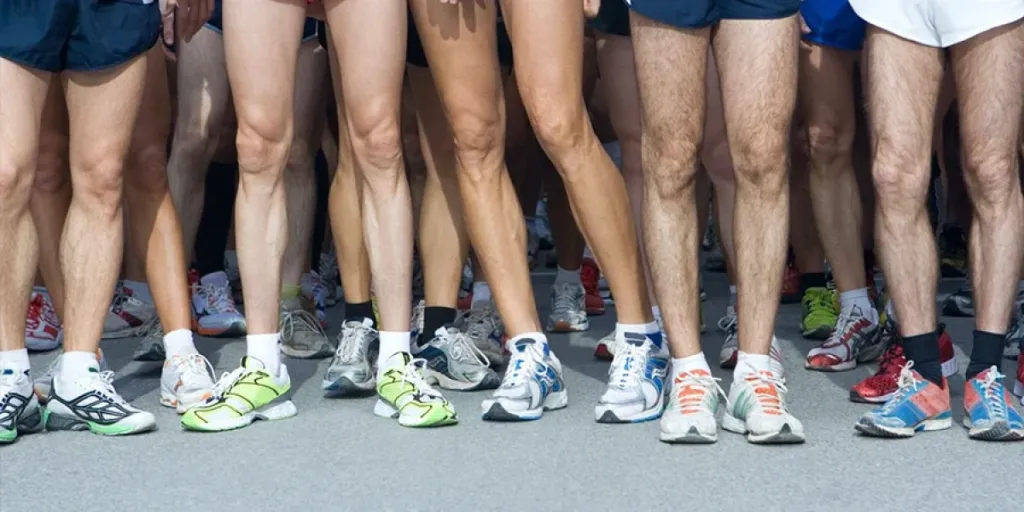
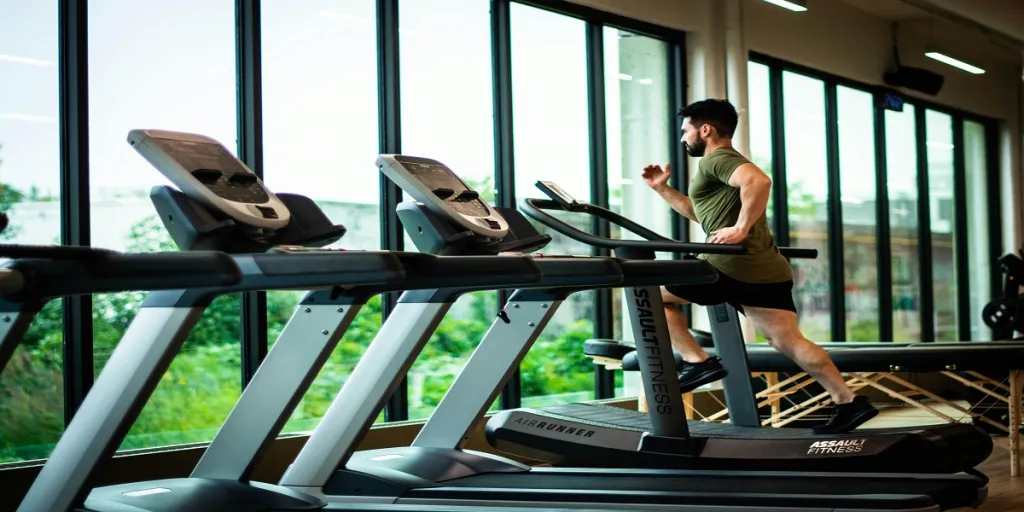
 Afrikaans
Afrikaans አማርኛ
አማርኛ العربية
العربية বাংলা
বাংলা Nederlands
Nederlands English
English Français
Français Deutsch
Deutsch हिन्दी
हिन्दी Bahasa Indonesia
Bahasa Indonesia Italiano
Italiano 日本語
日本語 한국어
한국어 Bahasa Melayu
Bahasa Melayu മലയാളം
മലയാളം پښتو
پښتو فارسی
فارسی Polski
Polski Português
Português Русский
Русский Español
Español Kiswahili
Kiswahili ไทย
ไทย Türkçe
Türkçe اردو
اردو Tiếng Việt
Tiếng Việt isiXhosa
isiXhosa Zulu
Zulu